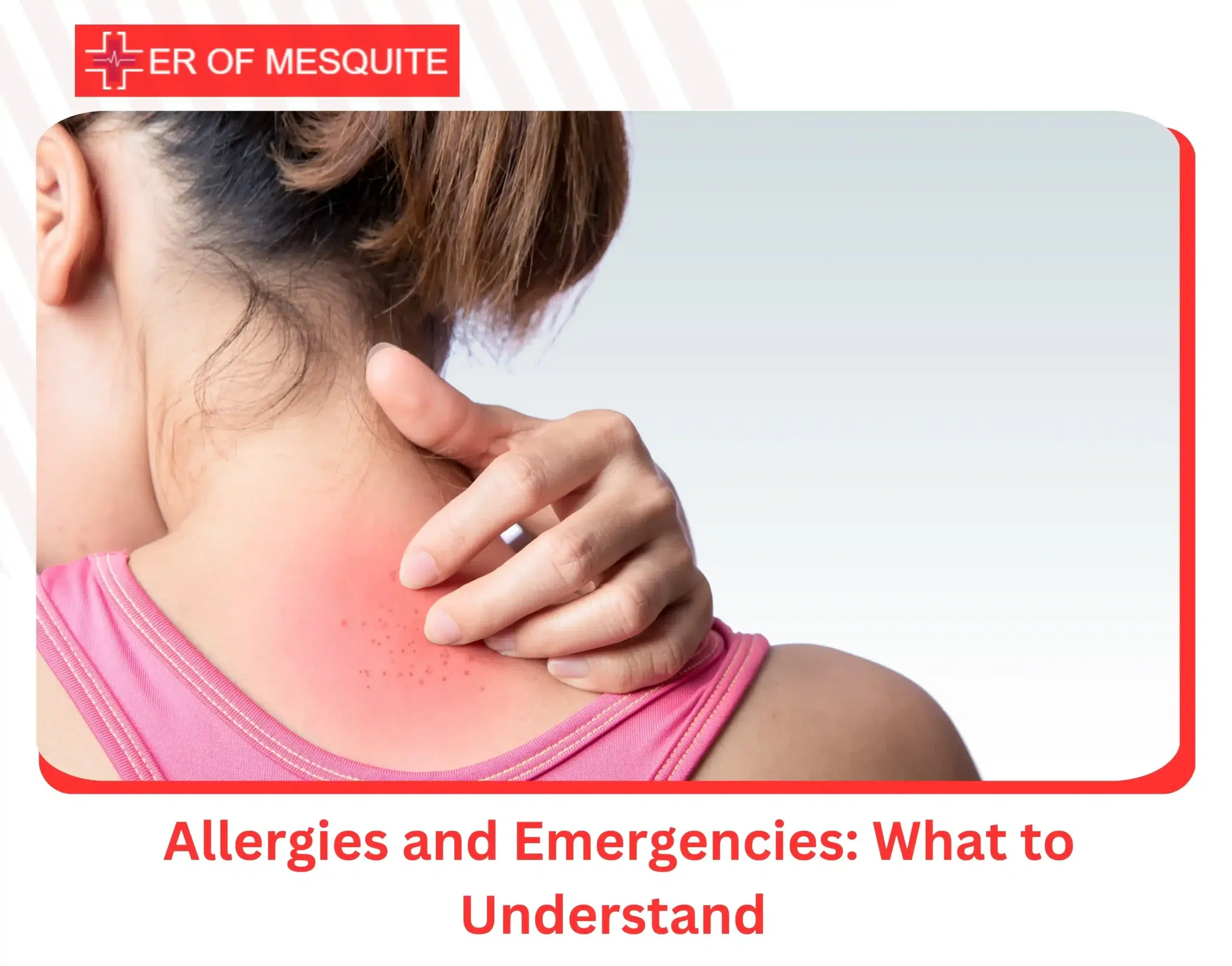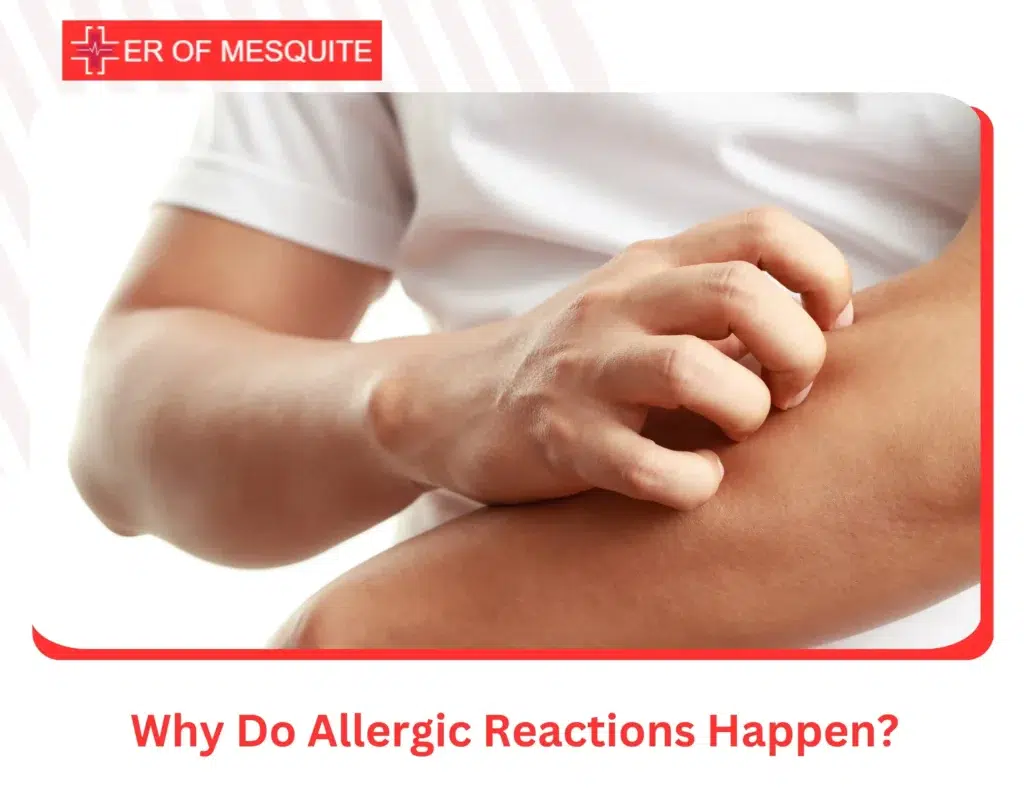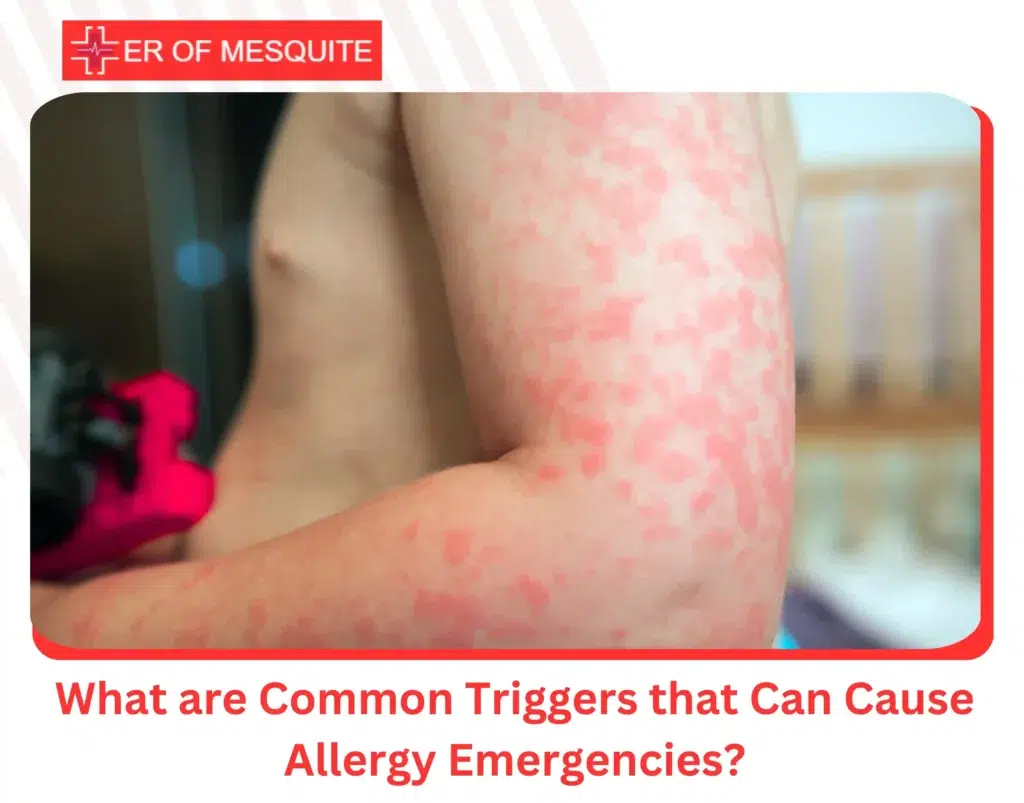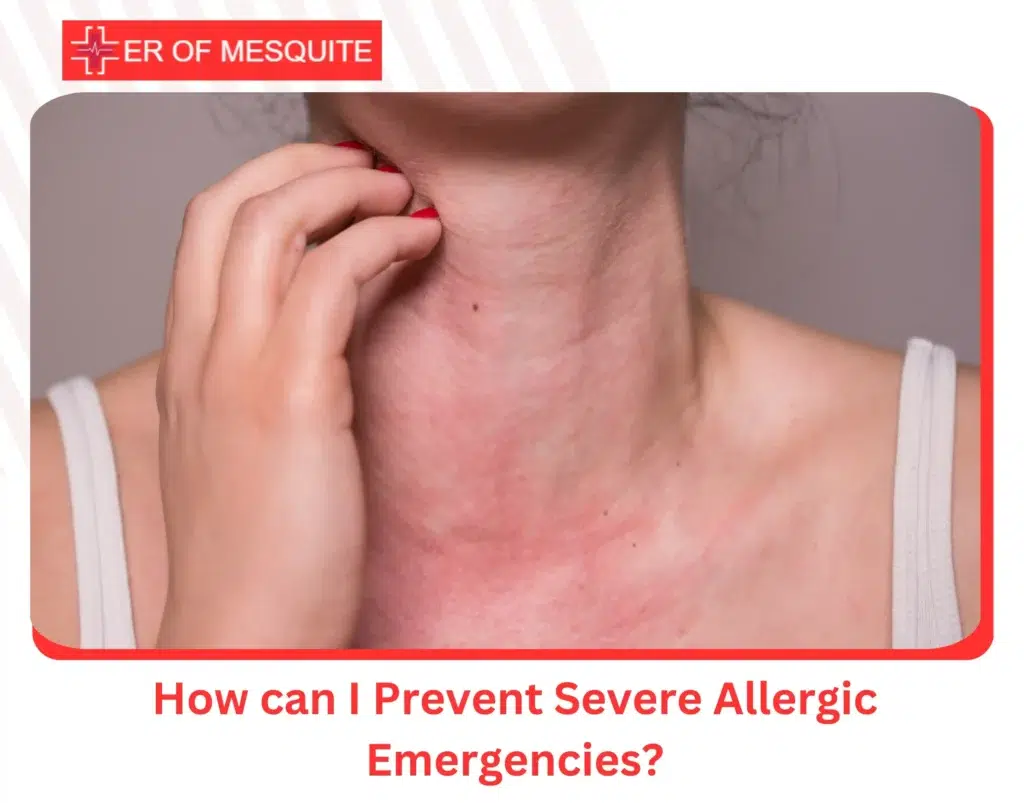Do you know that some allergic reactions can shut down vital organs within minutes? It’s true. Someone with a peanut allergy might accidentally eat something containing peanuts, and within seconds, anaphylaxis (a severe allergic reaction) sets in. If not treated fast, it can lead to cardiac arrest or even death.
Understanding the link between allergies and emergencies can help you spot the warning signs and get treatment early, instead of waiting and hoping it’ll pass. This guide will walk you through how allergies become medical emergencies, and how allergies ER visit can stop a life-threatening reaction in its tracks.
Why Do Allergic Reactions Happen?
Normally, your immune system produces antibodies and releases chemicals (like histamines) in a controlled, targeted way to fight harmful invaders in your body (viruses, bacteria, and toxins). It causes fevers, swelling, and mucus.
In people with allergies, the immune system mistakes harmless things (like pollen, peanuts, or pet dander) as dangerous. It overreacts by releasing these chemicals unnecessarily. Mild allergic reaction symptoms are:
- Runny nose
- Itchy or watery eyes
- Skin inflammation
- Puffiness under eyes
What Turns an Allergy Into an Emergency?
In severe allergic reactions (anaphylaxis), the immune system releases the same histamines and inflammatory chemicals but in huge, life-threatening amounts. Even a tiny trace of an allergen can set off this reaction in someone highly allergic. An abnormal amount of these chemicals in the body can cause:
- Narrowing of airways
- Sudden drop in blood pressure
- Irregular heartbeat
- Nausea, vomiting, and confusion
- You go into anaphylactic shock, where your organs don’t get the oxygen or blood flow they need to work.
Note: Anaphylaxis is a severe, potentially fatal allergic reaction that requires immediate medical attention.
5 Reasons You Need Allergy ER Treatment?
Here are some of the reasons why you should consider allergies ER visit:
- Severe Symptom Escalation: Anaphylaxis can cause airway obstruction, shock, or even lead to heart failure. If you experience a sudden escalation of your symptoms, you need to rush to the nearest emergency room.
- Unavailability of Epinephrine Auto-Injectors: Not having EpiPens on hand during an emergency can result in the condition worsening, which results in intense emergency allergy care.
- Swelling of Tongue and Throat: A severe reaction may cause angioedema, a deep swelling under the skin. If it affects your mouth or throat, it can block your airway and stop you from breathing. It requires immediate medical assistance to resume normal breathing.
- Anaphylactic Shock: It’s the most dangerous stage of anaphylaxis. Your blood pressure drops dangerously low, organs stop getting enough blood and oxygen, and you can go into unconsciousness, cardiac arrest, or even death if not treated fast.
- Unresponsive State: Disordered functions in the nervous system triggered by allergy symptoms may bring about confusion and drowsiness. These symptoms manifest as critically low blood oxygen levels near the brain, so they require intervention to prevent long-term injury and potential death.
What are Common Triggers that Can Cause Allergy Emergencies?
Let’s explore some common triggers that lead to allergies ER visits:
1. Food Allergies
One of the most common allergic responses people get is by consuming certain foods, such as:
- Nuts: Peanuts and tree nuts such as cashews, walnuts, and almonds.
- Dairy products: They contain specific allergens like milk, yogurt, or cheese.
- Shellfish: Such as shrimp, crab, and lobster.
- Soy, wheat, sesame seeds, and eggs.
2. Insect Stings and Bites
Insect allergies, including bites and stings from venomous creatures, are more spontaneous and intense, which can be life-threatening. A single bee sting has the potential to induce anaphylaxis in a few minutes. The list of insects includes:
- Bees
- Wasps
- Yellow jackets
- Fire ants
3. Medications
Sometimes, certain medications can carry serious allergy risks in sensitive individuals. Such medications include:
- Painkillers
- Antibiotics
- Penicillin
- ibuprofen
- Sometimes immunization shots
How can I Prevent Severe Allergic Emergencies?
Being proactive about allergies, ER management can reduce the risk of severe allergic emergencies. Here’s how you can prepare for it in advance:
- Avoid allergens as much as possible, such as food, insect stings, or environmental triggers.
- Following your doctor’s recommendation, keep your prescribed medicines, such as antihistamines, nasal spray, or any other medications, close to help manage the symptoms.
- Always carry epinephrine auto-injectors for severe allergic responses to your school, workplace, or trips.
- Have a written allergies ER plan for when and how to inject epinephrine. When to call for an ambulance and whom to contact. Share information about this plan with your family, school, workplace, and caregivers.
- Make sure the phone numbers of family/emergency contacts are handy for immediate assistance.
- Seek prompt medication care after an emergency, as biphasic reactions (second wave of anaphylaxis) can occur hours later.
Final Thoughts
Even if your past allergic reactions were mild, you shouldn’t wait and hope the reaction will go away on its own. Allergies can be unpredictable, and this time it might be severe. That’s why it’s important to get to the nearest emergency room as soon as you notice the first symptom.
At Mesquite ER, we are available 24/7 with the expertise, technology, and compassion to handle allergy-related emergencies effectively. Understand your triggers, stay prepared, and get life-saving care for allergies ER.
FAQs
1. How do I know if my allergic reaction requires emergency care?
If you experience symptoms such as difficulty breathing, swelling of the face or throat, dizziness, rapid heartbeat, or loss of consciousness, seek immediate emergency medical care.
2. Can mild allergic reactions turn into severe emergencies?
Yes, allergic reactions can escalate quickly from mild symptoms like hives or itching to severe, life-threatening emergencies. Always monitor symptoms closely and be prepared to seek emergency care if conditions worsen.
3. How do mild allergies differ from severe allergic reactions?
Mild allergies may cause symptoms like a runny nose or itchy eyes, while severe reactions (anaphylaxis) can cause airway swelling, low blood pressure, and confusion, and can be life-threatening.
4. What are the signs of a severe allergic reaction or anaphylaxis?
Look for sudden difficulty breathing, swelling of the tongue or throat, rapid drop in blood pressure, dizziness, confusion, or loss of consciousness. These require immediate emergency care.
5. What is the most effective immediate treatment for anaphylaxis?
The most effective immediate treatment for anaphylaxis is administering epinephrine using an auto-injector (e.g., EpiPen) and then promptly seeking emergency medical assistance.
6. Should I always carry an epinephrine auto-injector if I have allergies?
If you have a history of severe allergic reactions, always carry an epinephrine auto-injector and know how to use it. It can save your life in an emergency.
7. Why is it important to seek emergency care after using an epinephrine injector?
Because of the risk of biphasic reactions, where symptoms can return hours after the initial reaction.
8. What should I do if I experience a severe allergic reaction?
Go to the nearest emergency room immediately. Use an epinephrine auto-injector if you have one and call emergency services right away.



